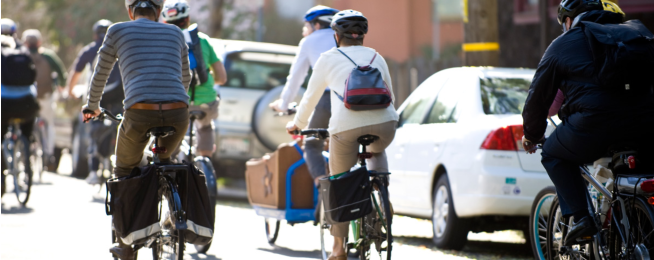One of the world's largest consulting firms, Deloitte, has released a comprehensive new study that makes some promising predictions for the role of bikes in shaping cities of the future.
The study suggests bikes are the future of urban transportation, focussing specifically on the role technology will play in doubling the amount of bike riders in many cities around the world and transforming how we move around cities.
Our study found that by 2050, 2.5 billion more people are expected to be living in cities than today, and more bicycle usage will be necessary because moving all these people around may strain capacity on existing transport options. Read more here ⇩ @carltonreid https://t.co/jdfqcPqNwB
— Deloitte US (@DeloitteUS) January 2, 2020
Key predictions include:
With 3 million people moving into cities around the world every week, the study predict an extra 2.5 billion more people living in cities by 2050. The rapid growth of our cities is straining the capacity on existing transport models, and trips by bike are predicted to pick up the slack.
This is already seen in many older European cities that have outgrown their original infrastructure. In cities where riding to work is not as common, such as in Northern America and Australia, Deloitte is predicting riding to work numbers to double between 2019 – 2022.
According to the study, growth in urban bicycle use will in turn "drive profound societal changes, reduction in traffic and pollution, less-crowded public transit systems, and improvements in public health."
The big winners in Deloitte's study are e-bikes. While the study is keen to point out that "electrifying a bike is not a new idea: The first patent for an electrically powered bicyle dates from 1895" – it does expect the e-bike market to continue to surge, thanks largely to ongoing improvements in lithium-ion battery technology.
The surge that we're seeing in places like the Netherlands, were more than half of all adult bikes sold in 2018 were electric; and Germany, where national e-bike sales double in the first half of 2019, is expected to go global as technological improvements make them lighter, cheaper, safer and more efficient.
"By 2023, the total number of e-bikes in circulation around the world—owned by both consumers and organisation—should reach about 300 million, a 50 percent increase over 2019's 200 million."
On top of increases in efficiency and accessibility of e-bikes, the study cites a number of other ways technology will aid the redesigning of urban transportation systems to prioritise bikes, such as:
- Apps that quantity the riding experience to make it more appealing to the individual, but also report valuable data to city planners.
- New technologies that can make riding safer, such as accelerometers and gyroscopes on action cameras that can detect a cash, bike helmets that call a predefined number on the rider's phone in the event of a collision, and wearable airbags.
- New tools to analyze traffic flow, such as AI tools that can classify road users by transport type from a video feed.
To the final point, the study uses an example of London implementing a new bike lane on one of their busiest bridges, which required the controversial removal of a lane previously used by cars, but ultimately enabled a 5 percent increase in the number of people crossing the bridge during peak hours.
The failure of the Melbourne blue bikes is not reflective of Deloitte's predictions for bike share programs moving forward.
"There are billions of bikes in the world... but only a fraction of them are regularly used. One reason for this is because bikes are seldom around when you most need them. With the rise of bikesharing, this may be about to change."
The study cites a number of experiments that show bikesharing programs that include e-bikes generate up to five times more usage for electric verses regular bikes, and similar patterns in usage declining when e-bikes were withdrawn from a program.
Deloitte suggest that tech improvements will lead to the electrification of bikesharing programs which will attract a larger percentage of the population such as the elderly and unfit – as evident with China's leading bikeshare program, where e-bike rides double that of standard bikes, with more than 700 million users per day.
Despite attracting a great deal of recent attention in many major cities around the world (predominantly funded by tech-start up companies), Deloitte chose not to include e-scooters in their study.
This was because they "expect that e-scooters will be overwhelmingly used only for first and last-mile travel, not for entire commutes of many kilometers that can take half an hour or more."
While admittedly e-scooters incorporate many of the technologies that are making cycling better and easier: GPS and data capabilities, app-based access, and availability through sharing platforms, the study thinks that "e-scooters higher injury rates may nudge users towards e-bikes and other safer modes."
You can download the full report here. (Note: the bike specific content starts on page 118).
Despite focussing on the technological transformation of bike riding, the study concludes that "the tech industry can't do it alone" – imploring public health systems and employers to consider investing in the long-term benefits of bike riding.
Become our friend
Find out more about Bicycle Network and support us in making it easier for people to ride bikes.


